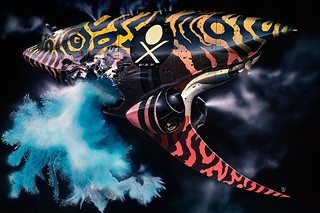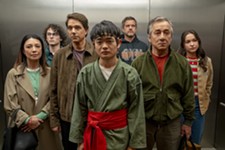DVD Watch: 'Jodorowsky's Dune'
Documentary about a film that never was heads this week's releases
By Richard Whittaker, 1:30PM, Tue. Jul. 8, 2014

There are a thousand movies that remain unmade every day. It takes a pretty special film to bother making a documentary about a film that never happened. That's the core argument behind Jodoroswky's Dune.
Joe Lansdale has joked that the best thing that can happen to a writer is that they sell the rights to a book, it never gets made, they get the rights back, and then they get to sell the rights again. At least that way the filmmaker doesn't get to fuck it up. So was Frank Herbert lucky when Alejandro Jodorowsky failed to adapt his sci-fi epic Dune, or was cinema cheated of a classic?
Now in his 80s, Jodorowsky looks like a university lecturer but talks like a cult leader, portraying his version of Dune as more than just a film. He understood that Herbert's pangalactic epic about the spice mines of Arrakis was about more than just space ships and lasers. His film was going to be a cinematic godhead, altering perception. Most specifically, he was going to produce a film that was going to get acid heads hallucinating even harder. No, really, that's what he admits.
Jodorowsky's Dune is a film about a cinematic dream team. Moebius on storyboards! H.R. Giger illustrating the vile house Harkonnen, and Chris Foss, the greatest designer of impossible space ships, filling the interstellar trade routes. Douglas Trumbull, then later Dan O'Bannon, on special effects. David Carradine as Duke Leto Atreides, with Pink Floyd as his personal soundtrack. Salvador Dali as the god-emperor of the explored university. And Jodorowsky himself, the art house maverick, rambling about spiritual warriors and films as prophets.
So what went wrong? "You can't have a masterpiece without madness," as Jodorowsky's producer Michel Seydoux delicately puts it.
Director Frank Pavich is an unexpected source for a film about such attempted high art, having spent much of his professional career working on 'reality' (in the loosest sense of the word) TV like Paranormal State (aka the poor ghoul's Ghost Hunters) and Room Raiders. His central theorem is that Jodorowsky's Dune could have rewritten cinematic history, that we would have been in a cooler, less spectacle-driven world than the one spawned by Star Wars, and that it would automatically have been better. Directors like Nicolas Refn Winding (Drive, Only God Forgives) and Richard Stanley (who went through familiar struggles with his South African supernatural epic Dust Devil) blame the studio system for not getting what Jodorowsky intended, and it's left to Star Wars producer Gary Kurtz to inject the dose of reality: That Jodorowsky, for all his grand visions, was never going to get this film made.
Now let's slam the brakes for a minute. I'm as big a fan as Santa Sangre as you'll find on this side of the keyboard. I also understand that a lot of people regard movies like The Holy Mountain as impenetrable '70s arthouse meditations, or just baffling stoner crap. I get that. There is an undeniable degree of wish fulfillment in saying that Dune would have made cinema better. It's an extrapolation from the success of 2001: A Space Odyssey: Because that was commercially successful and a visual landmark, there had to be room for a successor. But 2001 is a narrative minefield: It's several disparate arcs held together by imagery, and it's rarely clear exactly what the story is really about.
Is there really a market for super-sized impressionistic and surrealist cinema? Maybe so, maybe not. It takes BadAss Digest's Devin Faraci to drop some piss in the honey by suggesting that, well, maybe this just wasn't any way to make that film in 1975. And maybe there's a degree of emotional revisionism, so people can pretend that David Lynch's glorious but flawed version, or the bland 2000 TV miniseries for Sci Fi, never existed.
What director Pavich delicately implies is that Jodorowsky was the architect of his own destruction. Yelling at Roger Waters. Storyboarding a pivotal scene in which blood turns to semen. Casting his own son Brontis as Paul Atreides, the key figure in the battle for Arrakis and subjecting him to near-paramilitary training at the hands of an unblinking French martinet. His team's complete disinterest in the actual book and only in Jodo's vision. Because there's no way that any of that could be a bad sign.
Ultimately, this is a calmer version of Lost in la Mancha, although Jodorowsky comes across as more amiably avuncular than the carnage-fixated Terry Gilliam. In both cases, vision exceeds reality, Gilliam just thought he could demand that the universe reshape itself around his production schedule. Jodorowsky was simply using his film to reorder the world. By comparison, he seems positively humble. But when he tries to rewrite cinematic history as merely the fruit of his own failure, the messianic master becomes tyrannical.
Jodorowsky's Dune (Sony) is out on DVD and Blu-Ray/DVD combo. Also out this week:
The Raid 2 (Sony) Gareth Evans' sequel to his headstomping sealed bottle martial arts masterpiece extends the pencak silat fury out beyond one tower block and out into the Indonesian underworld (read our original review here.)
Bad Words (Focus) Jason Bateman adds to the canon of likably vile characters with Guy, a man who derives his pleasure from beating grade school kids at a spelling bee (read our original review here.)
Nymphomanic Vol 1 & Vol 2 (Magnolia) Lars Von Trier does what Kubrick tried but never managed: a star-studded cast (Charlotte Gainsbourg, Willem DaFoe, Stellan Skarsgård, Christian Slater) in a hardcore porn setting (read our reviews of Volume 1 and Volume 2.)
Point Blank (Warner) "I want my money. I want my $93,000." Lee Marvin's masterclass in revenge, adapted from Richard Stark's blissfully linear crime classic The Hunter. Mel Gibson and Jason Statham have tried to walk in his shoes, but no-one beats Marvin's stoic fury.
El Topo (Abkco) Jodorowsky's 1974 psychedelic Western, an absurdist Django.
A note to readers: Bold and uncensored, The Austin Chronicle has been Austin’s independent news source for over 40 years, expressing the community’s political and environmental concerns and supporting its active cultural scene. Now more than ever, we need your support to continue supplying Austin with independent, free press. If real news is important to you, please consider making a donation of $5, $10 or whatever you can afford, to help keep our journalism on stands.
Richard Whittaker, April 19, 2018
Richard Whittaker, April 3, 2018
DVD Watch, Jodorowsky's Dune, Alejandro Jodorowsky, Devin Faraci, Point Blank, Nymphomaniac, El Topo, Bad Words, The Raid 2










